How long do horses live? Well, it depends- the lifespan of a horse typically ranges from 20 -30 years old. The exact expected lifespan of a horse mainly depends on the horse’s breed and the type of life that they live.
It is not unusual for a horse to live past 30 years of age while the oldest living horse was reported to be approximately 62 years old. In recent years there have been significant advancements in equine health. These advancements have provided owners with more knowledge about how to better care for horses which increases the chances of a longer lifespan.
The advancements in equine health have also helped medical experts to better treat common causes of horse illness and disease.
Factors affecting Horse Longevity
Breed & Workload
There are more than 300 breeds of horses currently in the world today. They come in many different shapes, colors and sizes. Many of these breeds have been developed for specific uses.
As is the case with many animals, the bigger the horse, the shorter the lifespan. For example – drafts tend have slightly shorter lives than say an Arabian.
Just like dogs and other animals the life expectancy can differ between the breeds and types of horse. Ponies tend to live longer lives than larger horses and it is not uncommon for them to live into their late thirties. Arabians are known for their longer lifespans, while drafts tend to have much shorter ones.
The type of breed a horse is also a significant factor in the type of work they may do in their lifetime. Different horse breeds may do more energy intensive and riskier jobs which ultimately mean that they may have a shorter life expectancy.
For example, horse racing will typically be done with thoroughbred horses. A racehorse may begin their career at 2 years old and finish at 10. Horse racing is a dangerous sport and many horses sustain injuries from which they cannot recover.
If they do make it to retirement there are not many options in terms of care. As a result they are subject to abuse, neglect, and slaughter for human consumption. As a result numerous charities have been formed to protect them when they are no longer able to race. If they are well looked after, they can live to be up to 30 years old.
Disease
Just like dogs some horses are more predisposed to certain conditions than others. This is often the result of over breeding which ensures that genetic disorders are continuously passed from parent to offspring. For example Arabian horses can produce immune-deficient foals whereas Appaloosas are prone to eye problems.
One of the most common diseases affecting horses is Cushing’s disease (also known as PPID). It is known to affect all types of horses and while it does not directly kill horses, it can significantly contribute to other health issues which ultimately become fatal. It is known that ponies and Morgan horses have higher incidences of the disease.
Nutrition
The nutrition that a horse gets plays a significant factor in their health and overall life expectancy. A horse that grazes on high quality pasture is most likely to be in significantly better health than a stable bound horse that is fed a low quality feed.
Horse Stages
There are different terms for horse depending on their stage of life. These terms are widely used and help
| Foal | an equine of either sex that is up to one year old |
| Yearling: | A horse of either sex that is between one and two years old. |
| Colt | Male under the age of four. |
| Filly | Female under the age of four. |
| Mare | Female horse older than four |
| Stallion | Non-castrated male horse older than four years of age. Often just referred to as a horse |
| Gelding | Castrated male horse of any age |
World’s oldest Horse
The oldest horse in recorded history was Old Billy. He lived until he was 62 years old. Old Billy was a Cob/Shire horse that lived in Lancashire, England. Billy was owned by the Mersey and Irwell Navigation Company where he worked pulling barges up and down the canals. Billy died in 1822 and his skull can still be viewed at Manchester Museum.
More recently a pony by the name of Sugar Puff lived until the age of 57 before dying in 2007. Sugar Puff was a 10hh Shetland-Exmoor gelding and was put to sleep at home in West Sussex on the 25th of May 2007 following a number of health issues.
How to ensure horse longevity
Many of the same principles that apply to human longevity also apply in the case of horses. Exercise, diet, and regular check-ups are the best ways to ensure that a horse stays healthy. Check with your local vet for more comprehensive info on horse management.
Rest time
A significant part of any horse’s day should be assigned to rest. This obviously depends on the horse workload, age, and condition. An overworked horse can result in mental tiredness and it usually causes soreness, stiffness and overuse injuries. Finding the right balance between fitness and rest is essential for the long term health of the horse.
Proper Feeding
One of the most important factors in horse health is making sure they have access to continuous fresh water. Without fresh water a horse is much more likely to develop disease and
A horse should also ideally be able to graze as much as possible. The quality of the pasture is important as not all pasture will provide the adequate minerals that a healthy horse requires. Older horses should be receiving high-quality forage and grain and supplements as needed. Budget feed is unlikely to provide them with the nutrients that they require to maintain a healthy body.
The time of feeding is also significant. Older horses should be fed at the same time every day if possible. This has been shown to help maintain their overall digestive health.
Daily exercise
Older horses are more susceptible to degenerative musculoskeletal conditions such as laminitis and arthritis. One of the best ways to avoid this is to ensure that the horse stays moving.
Their cartilage and muscle fiber is more brittle and is more susceptible to damage which will ultimately cause lameness. The risk of these conditions can be mitigated through exercise and good horse management.
Pasture housing instead of excessive stall confinement is one of the most obvious way to protect against these conditions. If you cannot ride you should be longer them daily or be putting them on a walker.
Horse Dental Care
Just like Humans, horses require regular dental check-ups. Most domesticated horses should have their teeth floated about once a year. This is the practicing of filing down and removing the sharp edge that can form at the corners of the teeth. Domesticated horses often require a more regular check-up as horses that are fed in a stable may not benefit from the natural filing down of teeth that occurs when a horse is out on pasture.
Dental issues may be detected if you notice a horse carrying head to one, head tossing, bad odours, and if the horse is consistently drooling
As a horse gets older they may require even more dental care as they may start to lose their teeth. If this happens they may have trouble chewing and breaking down their food. As a result they may require a modified diet.
Hoof Care
Poor hoof management can result in horse lameness which can often lead to a slow decline in a horses overall health. Horse’s hoofs carry the full weight of the horse over a small area and for this reason need to be carefully managed and looked after.
Good hoof care includes regular visits by a farrier and regular checking and picking out. Unshod horses require more frequent examination.
How to tell a horses age?
A horse’s age can be approximated from an examination of the teeth. Over time a horses teeth will slowly become longer and more inclined. There are different ways to examine horse’s teeth depending on what stage the horse is at in life
Teeth Color: The color of a horse’s teeth changes during the course of their life. The milk teeth in young are white, and the permanent teeth (erupt at 2 ½ to 5 years of age) that replace them are creamy-yellow. As a horse ages further their teeth will become brown (20 years plus).
Baby Teeth: A very young horse’s age is determined by analyzing which teeth are present and which teeth are being lost.
Permanent Teeth: This method is only accurate until the age of 9 or 10. After 10 years of age a horse will have all of their permanent teeth
Estimating by Wear: Once a adult horse has all of its teeth it can be a bit more tricky to determine their age. The best way to tell their age is by conducting an in-depth examination of the current teeth. Specifically analyzing the shape, angle of growth, color and other factors can help to determine a reasonably accurate estimate of a horses current age.
Horse aging common questions
What age is considered old for a horse?
It depends on the breed and type of horse. In general a horse over the age of 25 is considered to be old. The equivalent age in a human is approximately 70 years. The table below shows an approximate equivalent for a human’s age.
| Human Age | Horse Equivalent |
| 1 | 6.5 |
| 4 | 21 |
| 13 | 44 |
| 25 | 70 |
| 36 | 100 |
What is the most common cause of horse death?
Injury, genetic mutations, diseases, and damaging effects of a horses environment can all contribute to various health issues which may cause a horse to die. The older the horse, the higher the risk of succumbing to a disease or health condition. Here are some of the most frequent conditions and reasons for a horses death.
- Colic: Horse colic refers to abdominal pain in horses and covers a wide range of gastrointestinal conditions. Colic can often be fatal without surgical intervention. Horses that are not treated, or treated too late after the onset of clinical signs, are at risk of death.
- Accidents: Accidents can occur when riding, during work. The accident itself may not be immediately fatal but could be enough to put a horse to sleep.
- Laminitis: Sometimes referred to as founder is a disease which affects the hoofs of horses. While laminintis itself is not fatal it disease will lead to perforation of the bone through the sole of the hoof. When this happens the horse may be unable to stand and is likely to be recommended for euthanasia. Laminitis can also contribute to a number of other diseases which can decrease a horses life expectancy.
Is horse life expectancy increasing?
This is a hard one to answer because of the lack of reliable data and studies available. However in general there seems to be a consensus that domesticated horses are living longer due to humans improved ability to treat and protect against common disease and illness. Our understanding of horse rehabilitation has also improved.
How long do horses live in wild vs domesticated?
There is a lack of reliable data to compare the life expectancy of wild and domesticated horses. In general we know that domesticated horses are more likely to live a longer life than their wild counterparts.
Mustangs are perhaps the best known breed of wild horses in North America. In the wild Mustangs can live up to 40 years. They travel in large free roaming herds in States such as California and Nevada. There is evidence to show that wild herds will protect hurt and disabled horses which can help them to live longer. However it is still thought that domesticated horses are more likely to outlive their wild relatives due to modern day advancements in equine healthcare.
Many common illnesses and injuries that are easily treatable in domesticated horses can often be enough to kill a wild worse. Wild horses are also at a greater risk of death from freak weather events, attack from other animals, and drought.
How do Vets decide when time is right to be put to sleep?
This decision depends on the vet, owner, the nature of the injury/sickness and the overall condition of the horse. For example treatment options for an older horse that breaks a leg are limited. In this case the most humane thing to do may very likely be to put the horse to sleep. This way the horse will avoid living out their final days in pain. The decision to put a horse to sleep is generally made on a case by case basis
What age should a horse stop being ridden?
This one is very much subjective. Regular and light exercise is good for a senior horses joints and mobility and will keep them fresh. However it is important to make sure you get a balance between riding and rest. The exact amount of regular riding depends on teach individual horses capacity to work.
Do Geldings live longer than stallions?
There seems to be a lack of conclusive evidence on this question but in general it is thought that geldings have a slightly longer life expectancy than stallions.
What breed of horse has the longest lifespan?
Just like dogs, it is known that some breeds live longer than others. There is no obvious front runner in terms of expected lifespan. Appaloosas are known for longevity and will regularly live to beyond 30 years if they can maintain good health.
Larger horses such as draft breeds typically have a shorter lifespan than smaller horses such as Arabians. In general Ponies have about 10 years greater life expectancy than the average horse.
References

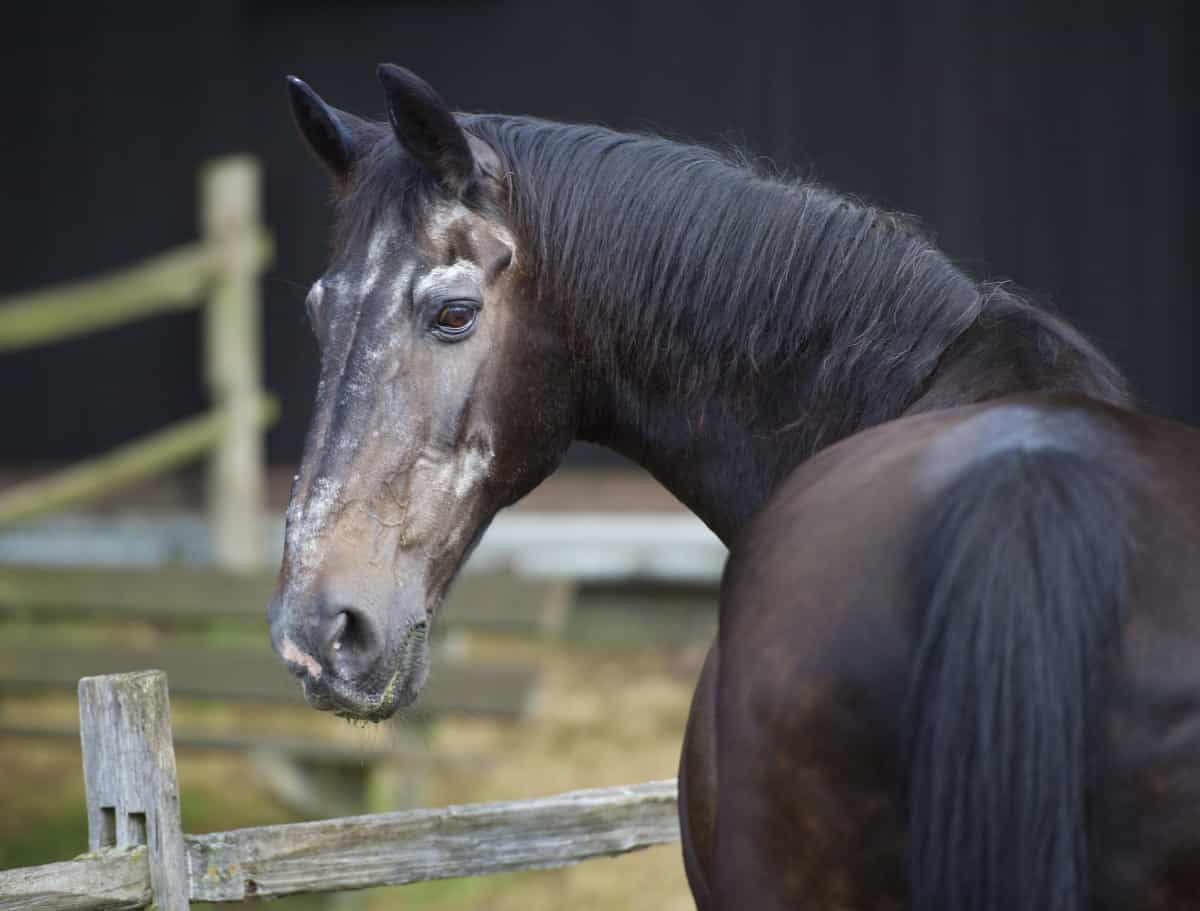
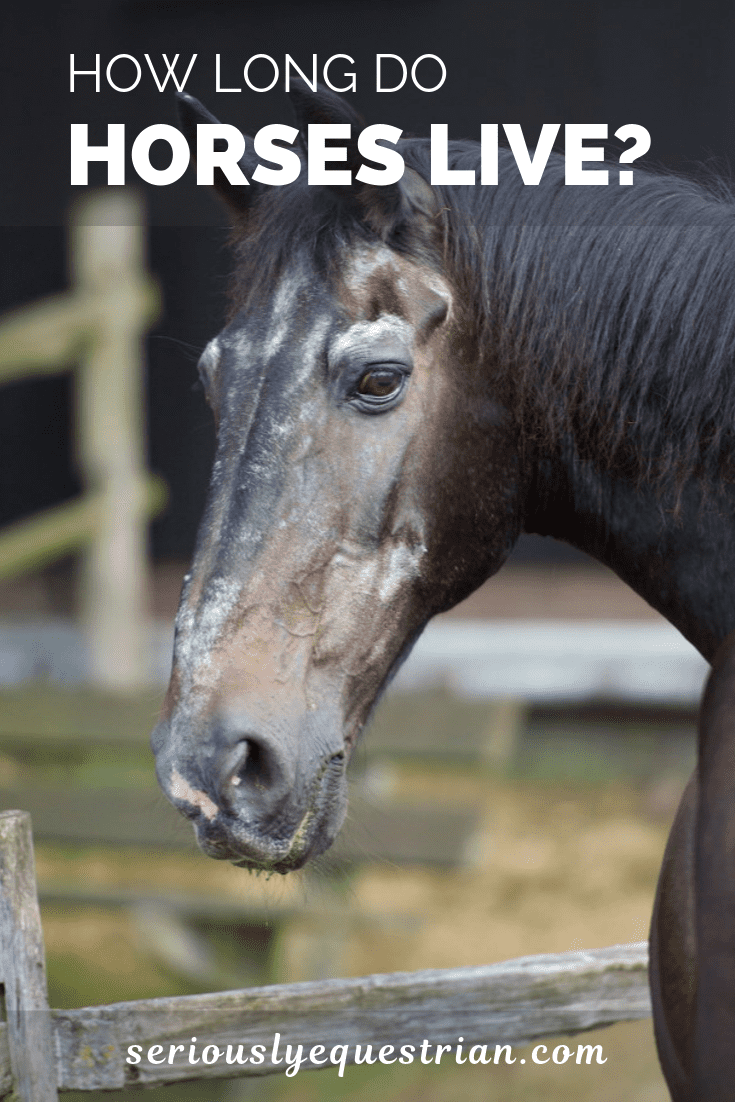
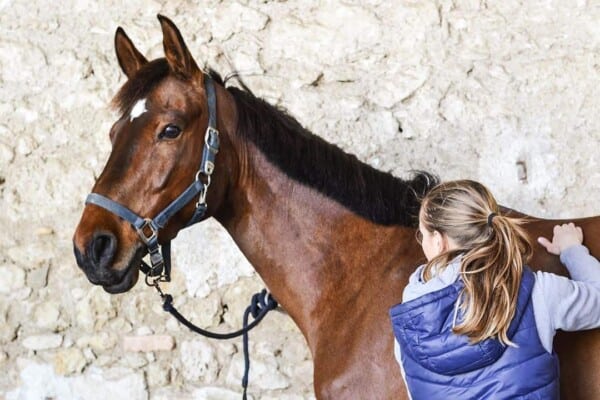
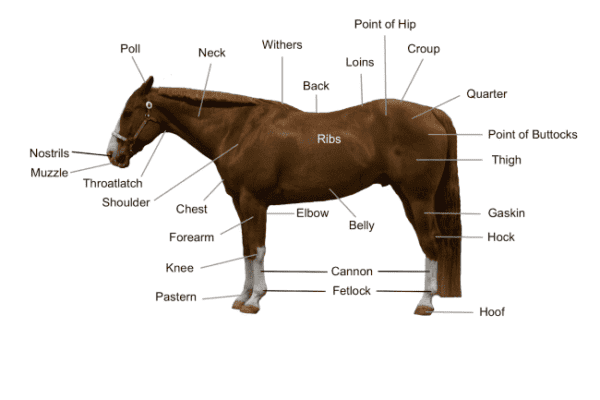
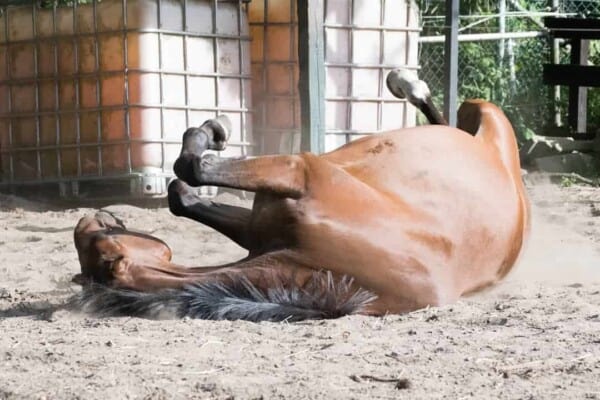
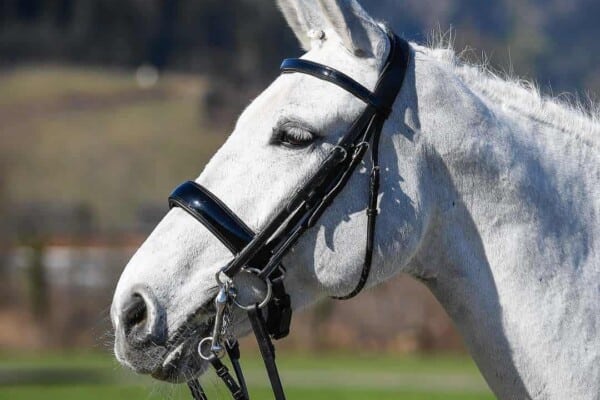
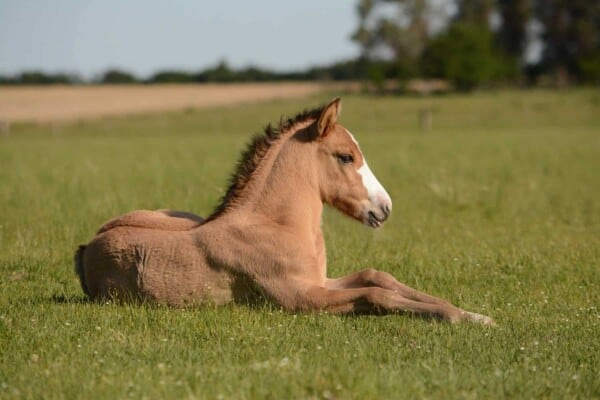
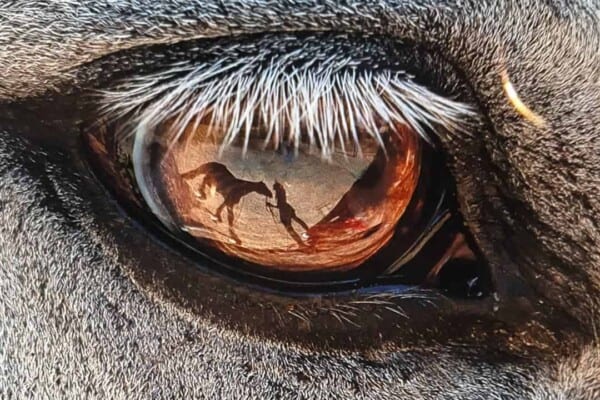
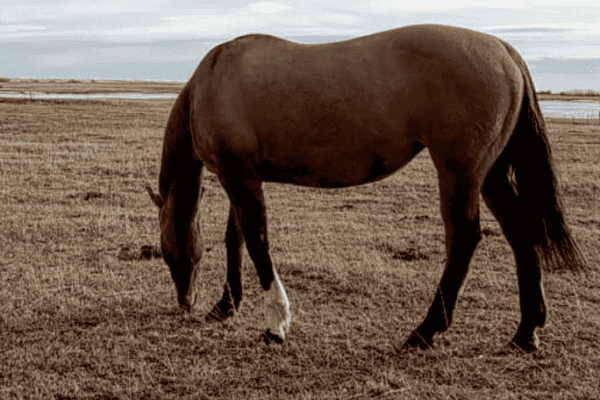
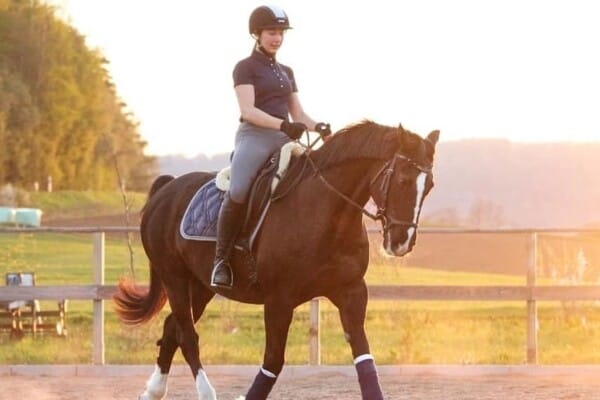
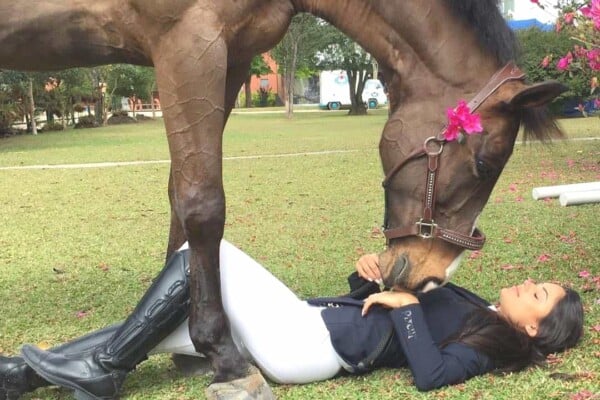

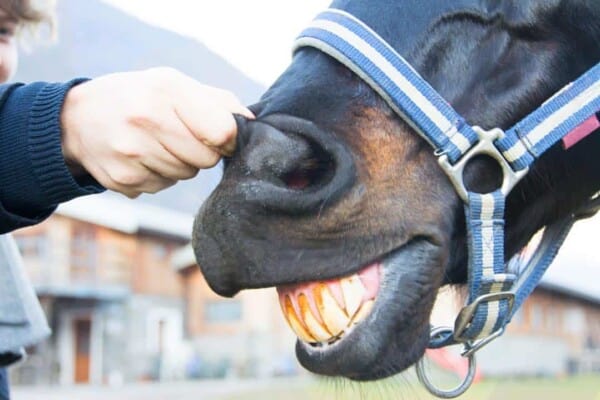
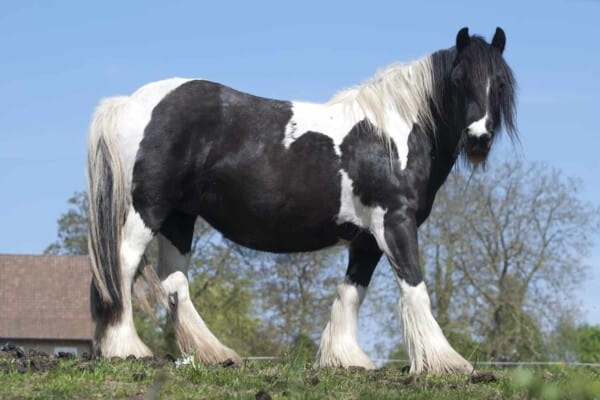
I had a retired ranch horse, a QH gelding named Sonny, who passed away earlier this year, at the age of 49. He had to be put down, after having lost a lot of weight over the summer, & his lameness had become uncontrollable. Many people asked me how we kept Sonny around to such an old age? Was it diet, exercise, or a combination of both”? All I can honestly say is “good genetics”!
I ride a Quarter horse gelding who is 32, and he shows no signs of slowing down. He’s never been sick (for the past 16 years anyway), and I suspect he will go until he drops. He’s out of the Doc lines.